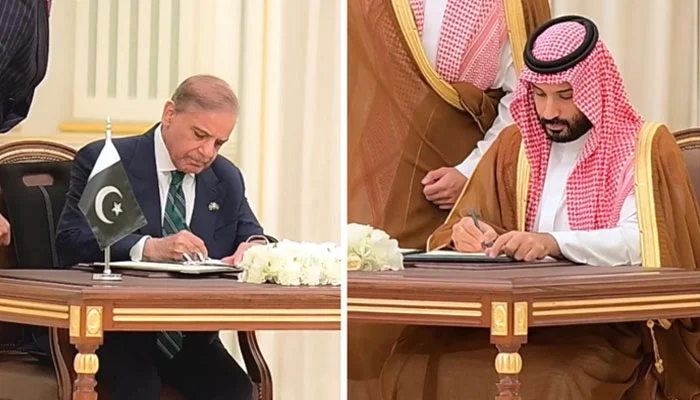The Strategic Mutual Defense Agreement signed between Pakistan and Saudi Arabia has opened a new chapter in one of the long-standing partnerships of the Muslim world. The pact claims that “any aggression against either of the two countries shall be considered an act of aggression against both,” binding the two nations into a framework of collective defense.
This pact is a significant development, marking a major shift in the security dynamics of the region.
“Pakistan’s role as a net security provider in the Arabian Peninsula has just been cemented.” analyst Uzair Younus said about the agreement.
Looking back at the partnership
The foundations of Saudi-Pakistan defense cooperation are not new. For many years, Riyadh and Islamabad have shared a bond that is not confined to politics. Also, during economic crises, KSA has stood by Pakistan by offering financial packages and oil facilities during hard times. However, Pakistan has provided military expertise and training to the Saudi armed forces.
The KSA often turned to Pakistan in order to gain professional military assistance during the Cold War period. In the 1980s and 1990s, Pakistani troops were stationed in Saudi Arabia, providing advisory and operational support. This arrangement was symbolic of the trust Riyadh placed in Islamabad at a time when the Gulf was deeply concerned about spill overs from the Iran-Iraq War and later Iraq’s invasion of Kuwait.
In terms of regional and Islamic world matters, both nations have also collaborated diplomatically, strengthening their stance. Despite these historical moments, their defense relationship remained informal, but today the new pact has changed this by making their cooperation legally binding and institutionalized. This reflects a recognition that formal relations and clear talks have become necessary in today’s world.
Read More: Pakistan, Saudi Arabia Sign Mutual Defense Pact, Following Israel’s Attack on Qatar
What’s in the agreement?
At its core, the pact emphasizes four main areas:
- Collective response to Aggression – A NATO-style pact which asserts that an attack on one nation will be considered an attack on either nation.
- Defense Collaboration – Strong institution ties between armed forces, defense ministries as well as defense industries of both nations.
- Intelligence and Technology Sharing– The two countries will collaborate on joint cyber defense, advanced surveillance systems and will share the latest technologies.
- Mutual Exercises and Training – In order to enhance interoperability and readiness against various threats.
The pact transforms mutual trust into tangible cooperation, demonstrating Saudi Arabia and Pakistan’s united stance to the world.
Implications for Pakistan
For Pakistan, the pact provides an opportunity and demands a commitment. It shows Islamabad’s status as a reliable security partner in the Gulf. This step could also help in strengthening economic cooperation. Furthermore, it would set a great opportunity for both nations, as defense ties often overlap with financial and developmental support.
Pakistan’s military expertise plays a vital role in this equation. Pakistan’s expertise in its military, demonstrated by its security actions at the national and international levels, makes it a dependable ally of Saudi Arabia, which faces multiple threats, including missile strikes and asymmetric warfare, particularly in the Yemen conflict.
The diplomatic ties, in return, would be beneficial for Pakistan, particularly in times of economic stress, due to Saudi Arabia’s offer of backing Islamabad.
Read More: Pakistan Navy and Saudi Navy joint excercise in Arabian Sea
Moreover, the agreement allows Pakistan to claim its position not only a South Asian power but also as a Gulf and Middle Eastern stakeholder. This is strategically important as Pakistan seeks to balance its ties with the global powers while maintaining relevance in Muslim majority alliances.
“This pact would not deter India from attacking Pakistan. But with 3-key powers-China, Turkey, and now KSA-fully on Pakistan’s side, Pakistan is in a very good place.,” notes the South Asia Analyst, Michael Kugelman.
Implications for Saudi Arabia
Due to the complex security environment in the Middle East, which includes Iran’s expanding regional influence, the protracted war in Yemen, and uncertainties regarding the depth of U.S. engagement in Gulf affairs, this agreement plays a vital role for Saudi Arabia. By formalizing the defense ties with Pakistan, Riyadh gains a dependable military partner with one of the most professional armies in the Muslim world.
This not only strengthens KSA’s deterrence capabilities but also demonstrates that Saudi Arabia is expanding its security architecture.
This agreement aligns with the goals of Saudi Arabia’s Vision 2030, which include enhancing domestic capabilities and reducing reliance on others in order to gain independence. Partnering with Pakistan’s experienced military and industrial sector helps Saudi Arabia move closer to self-sufficiency in the defense domain.
Regional and global dimensions
The Saudi–Pakistan pact cannot be separated from wider geopolitical shifts. It comes at a time when Gulf states are increasingly hedging against the possibility of U.S. retrenchment from the region. While Washington remains central to Gulf security, Riyadh and its neighbors are no longer content to rely exclusively on American guarantees.
“At this point, it is clear that Pakistan has taken up the role of a security provider, not just for Saudi Arabia but for the Middle East,” Former Pakistani Envoy, Maleeha Lodhi, remarked.
Read More: Gulf States Move Toward Joint Defense After Doha Strike
Through this pact, Saudi Arabia shows Iran that KSA is not alone. With Pakistan as a defense partner, the Kingdom is enhancing its security framework. Since Pakistan has border and trade links with Tehran, it needs to navigate carefully in this partnership under the pact’s umbrella. In short, the relations of Pakistan with Iran must be preserved.
The agreement also has implications at the global level, particularly regarding China’s growing influence. Pakistan and Saudi Arabia are the key participants in the Belt and Road Initiative and the robust defense cooperation between them could support strategic goals of China, such as securing energy supply chains and stabilizing critical trade routes across South Asia and the Gulf, thereby influencing the dynamics of great-power competition in Eurasia.
Possible challenges
The practical implementation of this pact would only determine its actual success. To make the pact effective, Saudi Arabia and Pakistan need to conduct regular joint drills, share intelligence seamlessly, and collaborate on defense tech.
With ongoing tensions with India and internal security concerns, Pakistan’s military commitments elsewhere cannot be compromised by its obligations to Riyadh. At the same time, Saudi Arabia’s growing partnership with Pakistan requires careful consideration in order to ensure that there are no constraints on US-Pakistan relations.
This is because Washington plays a crucial role in Pakistan’s access to global financial institutions and receives military support from the US as well.
Pakistan’s new alliance may be perceived differently by regional players like Turkey, Iran and Qatar, who might view it as the formation of a regional bloc. This can cause potential strain in Pakistan’s fragile relations with Middle Eastern states.
To conclude, the Saudi-Pakistan defense pact symbolizes mutual trust and shared strategic outlook. Pakistan gains greater influence and power in the region by being a key security partner for Gulf countries. Saudi Arabia becomes stronger in defense and fosters its self-sufficiency.
The pact sends a clear signal that Saudi Arabia and Pakistan see their security as closely linked. In a region marked by uncertainty and shifting alliances, this agreement marks a major step towards bolstering their collective strength.
Building on their historical bond, the two nations are aiming to strengthen their alliance, which marks a new era of cooperation and mutual defense.
*The views expressed in this article are the author’s own and do not necessarily reflect the editorial policy of TDI.

Sadia Sohail
Sadia Sohail is an MPhil student of Strategic Studies at National Defense University (NDU), Islamabad, with a bachelor's in International Relations from NUML. She can be reached at sadiasohail010622@gmail.com



